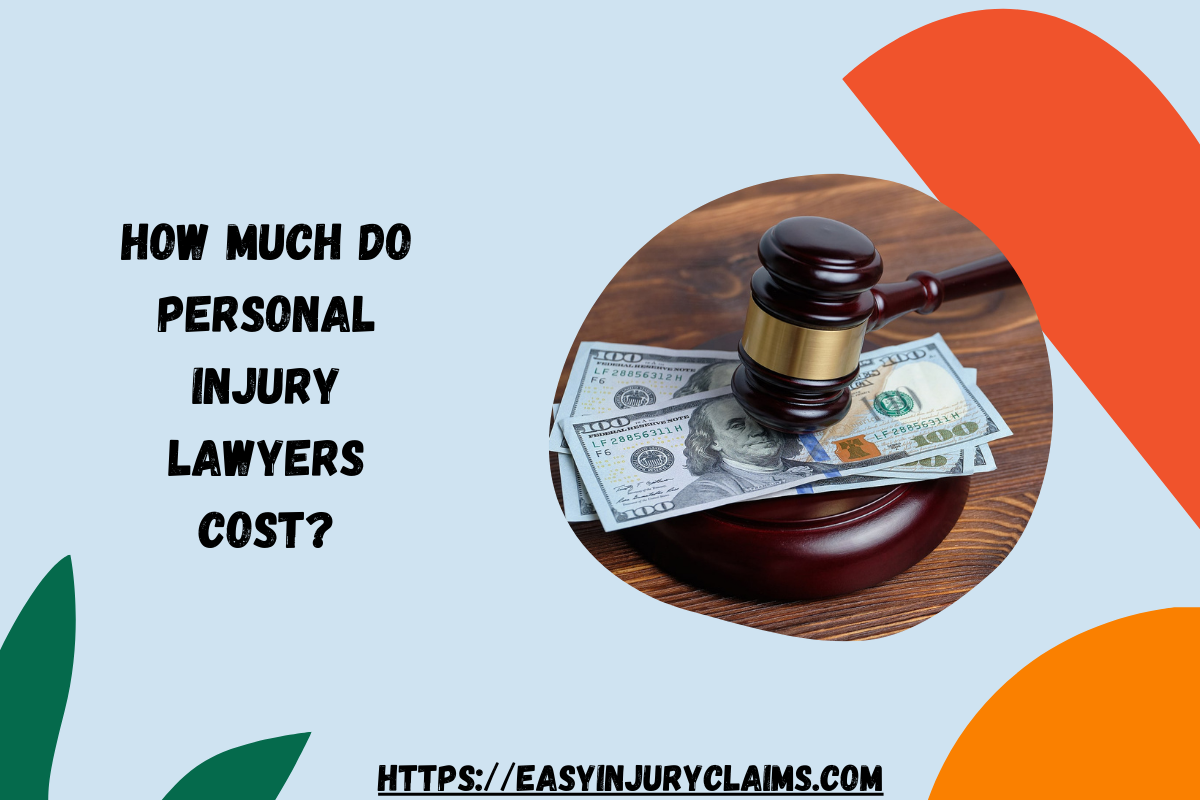Introduction
Personal injury cases happen when someone is hurt because of someone else’s actions. Examples include car accidents or slips and falls. Personal injury lawyers help people in these situations. They work to get compensation for the injured person. Understanding lawyer costs is very important. It helps to know what to expect financially. This way, you can make informed decisions about hiring a personal injury lawyer. Knowing the costs ahead of time can prevent surprises and help you manage your budget better.
Understanding Personal Injury Lawyer Costs
What are personal injury lawyer costs? These are the fees you pay when hiring a personal injury lawyer. They cover the lawyer’s work and help with the legal process. Knowing these costs helps you prepare financially.
Types of fees associated with personal injury lawyers include:
- Contingency Fees: The lawyer gets paid only if you win the case. They take a percentage of the money you receive.
- Hourly Rates: You pay the lawyer based on the time they spend working on your case. Each hour of work costs a set amount.
- Flat Fees: You pay a single, fixed amount for the lawyer’s services. This is less common in personal injury cases.
- Retainers: You pay a set amount upfront. The lawyer uses this money as they work on your case.
Understanding these fees helps you choose the best way to pay for legal help.
Contingency Fees
Explanation of contingency fees: This is a payment method where the personal injury lawyer gets paid only if you win the case. Instead of paying upfront, you agree to give the lawyer a percentage of the amount you win or settle.
How contingency fees work: When you hire a lawyer with a contingency fee arrangement, you do not pay any money upfront. If your case is successful, the lawyer takes a percentage of the settlement or court award. If you do not win, you do not owe the lawyer anything.
Pros and cons of contingency fees:
- Pros:
- No upfront costs: You do not have to pay anything before your case starts.
- Risk-sharing: The lawyer has a strong incentive to win your case since their payment depends on it.
- Cons:
- Higher cost if successful: The percentage taken by the lawyer might be high, which can reduce the amount you receive.
- Potential for conflicts: Some lawyers might push for a quick settlement rather than a better outcome to ensure they get paid.
Understanding these points helps you decide if a contingency fee is the right option for your case.
Hourly Rates
What are hourly rates? Hourly rates are fees you pay based on the amount of time a personal injury lawyer works on your case. You are billed for each hour the lawyer spends working, including meetings, research, and court appearances.
When might a lawyer charge hourly rates? Lawyers might use hourly rates in cases where they do not work on a contingency fee basis. This can be common for less complex cases or in situations where you need legal help but are not seeking a large settlement.
Pros and cons of hourly rates:
- Pros:
- Clear costs: You know exactly how much you are paying for each hour of work.
- Flexibility: You only pay for the time actually spent on your case.
- Cons:
- Unpredictable total cost: The final cost can be high if the case takes a lot of time.
- Potential for higher bills: Lawyers might work slowly or bill for more hours than expected.
Understanding hourly rates helps you plan your budget and decide if this payment method fits your needs.
Flat Fees
What are flat fees? Flat fees are a fixed amount you pay for a lawyer’s services. This amount does not change, no matter how much time the lawyer spends on your case.
Situations where flat fees are used: Flat fees are often used for straightforward legal work, such as drafting legal documents or handling simple legal matters. In personal injury cases, flat fees are less common but may be used for specific services or consultations.
Pros and cons of flat fees:
- Pros:
- Predictable cost: You know the total amount you will pay from the start.
- No extra charges: The fee remains the same, regardless of the time the lawyer spends on your case.
- Cons:
- Limited scope: The flat fee might not cover all aspects of your case, leading to additional costs.
- Potential for less effort: Some lawyers might not work as hard if they are paid a fixed amount, regardless of the case’s complexity.
Knowing about flat fees helps you choose a payment method that fits your case and budget.
Retainers
Explanation of retainer fees: A retainer fee is an upfront payment made to a personal injury lawyer. This fee is used to cover initial costs and secure the lawyer’s services. It is a way to ensure that the lawyer is available to work on your case.
How retainers work in personal injury cases: In personal injury cases, a retainer fee is paid before the lawyer begins working on your case. The lawyer uses this money as they work. If the case is complex or expected to last a long time, the retainer might be higher. Any unused portion of the retainer is typically refunded if the case ends early.
Pros and cons of retainer fees:
- Pros:
- Secures lawyer’s services: You have the lawyer’s commitment from the start.
- Potential for better service: The retainer shows your seriousness, which might encourage the lawyer to work harder.
- Cons:
- Upfront cost: You need to pay the retainer before the lawyer starts working.
- Possible additional costs: If the case costs more than the retainer, you might need to pay extra.
Understanding retainer fees helps you manage your budget and decide if this payment method works for your needs.
Additional Costs and Expenses
Common additional costs in personal injury cases: Personal injury cases can involve extra costs beyond the lawyer’s fees. These can include:
- Court fees: Charges for filing documents and other administrative tasks in court.
- Expert witness fees: Payments to experts who provide testimony or evidence to support your case.
- Medical record fees: Costs for obtaining and copying medical records.
- Investigation costs: Expenses for gathering evidence or conducting interviews.
How these costs are handled: Additional costs are typically handled in one of these ways:
- Paid upfront: You might need to pay some costs as they arise.
- Deducted from settlement: In some cases, these costs are deducted from the final settlement or award if you win the case.
- Reimbursed: If you win, the court may order the other party to pay these costs.
Understanding these costs helps you prepare for the financial aspects of your case and avoid surprises.
How to Estimate Total Costs
Factors that affect the total cost of hiring a personal injury lawyer:
- Complexity of the case: More complex cases often require more time and resources, increasing costs.
- Lawyer’s fee structure: The type of fee arrangement (contingency, hourly, flat fee, or retainer) impacts the overall cost.
- Additional expenses: Costs for court fees, expert witnesses, and other expenses can add to the total.
- Duration of the case: Longer cases usually result in higher costs due to the extended time spent on legal work.
Tips for getting an accurate estimate:
- Discuss fees upfront: Ask the lawyer to explain their fee structure and any additional costs.
- Request a written estimate: Get a detailed written estimate of all potential costs before agreeing to hire the lawyer.
- Ask about additional expenses: Inquire about possible extra costs, such as expert witness fees and court charges.
- Review the contract: Carefully review the contract to understand what is included in the fee and what is not.
Following these tips helps you get a clear idea of the total costs and manage your budget effectively.
Negotiating Lawyer Fees
Tips for negotiating fees with a personal injury lawyer:
- Research average fees: Understand typical fees for personal injury lawyers in your area to have a baseline for negotiation.
- Discuss your budget: Be clear about what you can afford and see if the lawyer can work within your budget.
- Ask for a breakdown: Request a detailed breakdown of all costs and fees to identify areas where you might negotiate.
- Compare offers: Talk to multiple lawyers to compare their fees and services, which can give you leverage in negotiations.
What to discuss before signing a contract:
- Fee structure: Confirm the type of fee arrangement (contingency, hourly, flat fee, or retainer) and how it will be applied.
- Additional costs: Clarify who will cover additional expenses like court fees or expert witness costs.
- Payment terms: Agree on when and how payments will be made, including any upfront fees or retainers.
- Scope of services: Ensure you understand what services are included in the fee and what might incur extra charges.
These discussions help you negotiate a fair agreement and avoid surprises later on.
Paying for a Personal Injury Lawyer
Options for paying lawyer fees:
- Contingency Fees: You pay the lawyer a percentage of the amount you win or settle. No payment is required unless you win the case.
- Hourly Rates: You pay for each hour the lawyer works on your case. This requires regular payments based on the time spent.
- Flat Fees: You pay a fixed amount for the lawyer’s services, regardless of the time spent on your case.
- Retainers: You pay an upfront amount that is used as the lawyer works on your case. Any remaining amount may be refunded if not used.
Impact of payment structure on your case:
- Contingency Fees: Aligns the lawyer’s interests with yours, as they only get paid if you win. This can motivate the lawyer to work hard, but their fee percentage might be high.
- Hourly Rates: Provides clear costs based on actual time spent, but can be unpredictable and potentially high if the case takes longer.
- Flat Fees: Offers predictable costs but might not cover all aspects of the case, leading to additional expenses.
- Retainers: Ensures the lawyer’s commitment from the start but requires upfront payment. You may need to pay extra if the retainer does not cover all costs.
Choosing the right payment option affects how you manage your finances and how the lawyer handles your case.
Conclusion
Understanding personal injury lawyer costs is essential for managing your finances effectively. Key points include knowing the different fee structures—contingency fees, hourly rates, flat fees, and retainers—and being aware of additional costs such as court and expert witness fees. Properly budgeting for these expenses helps avoid financial surprises and ensures you are prepared throughout the legal process.
FAQs
- What is a contingency fee? A contingency fee is a payment arrangement where the lawyer only gets paid if you win your case. They take a percentage of the settlement or award.
- How do hourly rates work? With hourly rates, you pay for each hour the lawyer works on your case. The total cost depends on the number of hours spent.
- What is a flat fee? A flat fee is a fixed amount paid for the lawyer’s services, regardless of how much time they spend on your case.
- What is a retainer fee? A retainer fee is an upfront payment made to secure the lawyer’s services. It is used as the lawyer works on your case.
- Are there additional costs in a personal injury case? Yes, additional costs can include court fees, expert witness fees, and other expenses related to your case.
- How can I estimate total lawyer costs? Estimate costs by discussing the fee structure with the lawyer, requesting a written estimate, and asking about potential additional expenses.
- Can I negotiate lawyer fees? Yes, you can negotiate fees. Discuss your budget, ask for a breakdown of costs, and compare offers from different lawyers.












Got a Questions?
Find us on Socials or Contact us and we’ll get back to you as soon as possible.